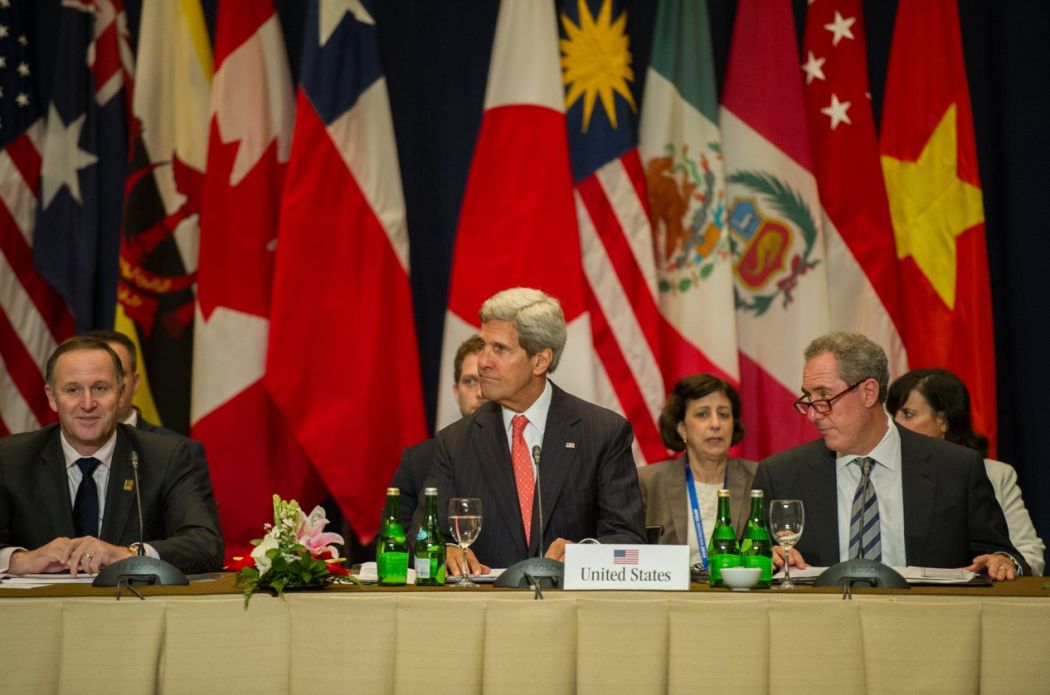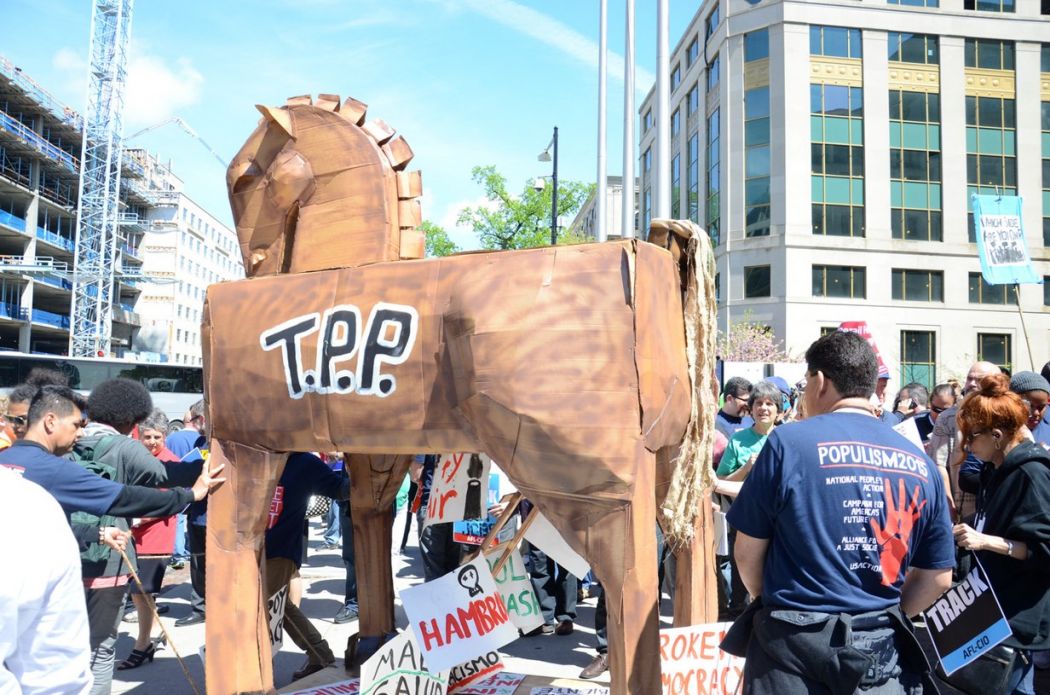The Trans-Pacific Partnership (TPP), a comprehensive treaty that would both liberalise and standardise trade among a whopping twelve Pacific Rim nations, is close to dying. It is a sign of the times, and there is some very ominous writing on the wall. TPP may not be perfect, but the alternative is pretty damn lousy.
We live in a time when the liberal orthodoxy is under attack, the post-war consensus is fraying at the edges and worn down in the centre simultaneously. Yet, the combination of free markets and free trade has actually delivered more for humanity than any other economic system. Since the launch of the General Agreement on Tariffs and Trade (GATT) system in 1947, absolute poverty has been all but eradicated.

The trading system has held protectionist impulses at bay and prevented a slide into conflict that, throughout history, has accompanied these same protectionist and often nationalist impulses. Global growth increased by 1,000% between the launch of the 1947 trade round and 2001. Between the creation of the Roman Empire and World War I it grew by a factor of two. Billions of the world’s people have been lifted out of poverty. It is by far the most successful economic system, but the undeniable problems that it created have led to populist insurgents offering easy answers which endanger the entire system.
When it comes to the TPP, in many ways the epitome of the liberal orthodoxy, its imminent demise leaves a vacuum for a rising power to rewrite the rules of trade – in its own favour, naturally. That power, which has benefited from the model more than any other nation in the past two decades, is the People’s Republic of China. The dangers of letting China dominate trade in the Pacific Rim area is enormous, the gains for the smaller nations in the regions are doubtful.
Before China exploded onto the international trade scene, most nations that liberalised trade had at one time or another in the process also liberalised its politics. China successfully adapted Japan’s mercantilist model to become a manufacturing powerhouse, but unlike previous copycats of Japan – South Korea and Taiwan – it managed to prevent a rising middle class to demand the kind of freedoms that Japanese, South Koreans and Taiwanese now take for granted as unalienable rights.

There are intellectual traditions against free trade that are almost as old as the publication of Adam Smith’s An Inquiry into the Nature and Causes of the Wealth of Nations. Free trade has been denounced as it was used by former imperial powers to open up less developed markets through gunboat diplomacy and extortion. It is true, nineteenth century and early twentieth century colonising western nations often used free trade as a false flag.
However, instead of denying trade’s benefits by denouncing its imperialist past, we should celebrate the mostly liberal era after World War II, when many colonial empires were dismantled and many of its former subjects were lifted out of poverty. New global rules first allowed and then forced governments to take a step back, let the wealth accumulate and spread, and allow the peaceful march of liberal values of human rights and liberties. Just looking at the trade houses of Hong Kong we can see both the ugly imperialist past and the liberalizing vitality of trade. Denouncing all of it brings to mind a baby and some bathwater. Agitating against TPP is just that and the alternative bathwater is much less healthy for Asia’s babies.
Another strain of criticism of free trade and free markets focuses on what cannot be expressed in hard currency. The actual price of progress is higher than on the spreadsheet: worker exploitation, destruction of natural beauty and stripping of resources, pollution and price gauging. However, if that is what people are worried about, then the TPP sets a very high standard. The treaty includes provisions for workers’ safety, fair wages, climate trade-offs and environmental protection. It is a cruel irony for the workers of Asia and the magnificent natural beauty of the region that the near-death of TPP will pass the rule-setting baton to the People’s Republic of China, which, despite its official socialist ideology, has a very poor record when it comes to workers’ safety and fair wages, let alone the environment.
One simply has to visit an average coal mine of Shaanxi, near the backwater town of Hancheng, to see that the extraction of one of the country’s rare natural resources is done with little or no regard for workers’ safety or salary, the environment or the quality of life in nearby Hancheng. In the last six months alone, 17 people died in the same mine while these accident-prone miners had not been paid for that same period of time and fine coal dust seeped into the city’s water supply.
It would be too simplistic to denounce all criticism of free global trade as leftist lunacy. Indeed, many unapologetic Socialists who once extolled Soviet central planning, now do believe that the system of free trade could be improved by tweaking and no longer advocate a complete overthrow of the system. They advocate some fuzzy notion of regulation and limited planning to replace what they see as a corrupt system stacked against the little guy.
The medicine may be worse than the disease, with rent-seeking and inflation, but there is always room for improvement and nobody should disregard constructive criticism. However, shooting a well-meaning leftist torpedo at TPP would not mean higher standards for the less-developed Pacific Rim partner nations. It would instead mean a race to the bottom in a trade zone dominated by a nation that simply disregards annoying standards if they get in the way of the pursuit of what the leftists so decry: profit and empire.
An equally deluded criticism of free trade, even less open to rational counter-argumentation, comes from the other side of the spectrum, the populist right. The underlying idea is frighteningly simple and familiar: if jobs go to foreigners they do not go to our native workers and therefore free trade is bad.
Indeed, Donald Trump is part of a movement that has been around in Europe for much longer. Trump’s anti-TPP belligerence leaves China ready to rewrite the rules of regional trade, while Europe has Putin lurking on its borders, with several European nativists expressing almost Trump-like admiration for the Russian strongman. Trump is wrong on so many issues that being wrong on TPP seems minor right now, but in the end his un-Republican attack on free trade will leave Americans poorer and wealth inequality bigger. There are many reasons to dislike the GOP before Trump destroyed it, but its support for free trade is not one of them.
There is no denying that there are problems associated with free trade. The sheer size of China means that it sent shock waves throughout the world economy when it joined the WTO in 2001, according to economist David Autor of MIT. There seems to be some truth in the argument that the massive scale of China’s rise destroyed blue collar jobs at an unprecedented rate in the west.
Especially hit hard was American manufacturing, which explains the rise of Trump and Sanders and their protectionist delusions, using the many unfounded criticisms of free trade itself. As I explained before, Trump’s protectionism is nakedly populist, while that of Bernie Sanders has a veneer of respectability. You can campaign for Trump in the bar, you could campaign for Bernie in the staff room of a university or college. Trump is not afraid to call for America First as his foreign policy, despite its nasty historical connotations; Bernie Sanders advocated ‘fair trade’ above free trade, despite the fact that it is often the poor who are hit hardest when governments interfere in markets.
No matter the different labels, they have both put the same populist and protectionist ingredients in a dangerous concoction of nativism and economic envy. Trump has doubled down on his wooing of disgruntled Bernie Sanders supporters, especially those who remember the first President Clinton’s laudable defence of free trade and courageous defiance of organised labour, a huge Democratic constituency.
In an attempt to walk back her previous endorsement of TPP as ‘the gold standard’ for trade agreements, Hillary Clinton delivered a thumping speech in the industrial Detroit suburb of Warren, Michigan, on August 11. She was forced to say that she now opposes TPP, and promises as President to oppose it.
This is a political ploy because of lackluster support for the Clinton candidacy from former Bernie Sanders supporters on the one hand, and an uncharacteristic Republican nominee on the other. Less than ten days before her Michigan speech, the current President stood next to Singaporean leader Lee Hsien Loong and said that without TPP ‘China will step in […] and you will get a low-standard, lowest-common-denominator trade deal’.
And China is eager to step in. Beijing will celebrate a quiet victory many times more lasting than the mostly symbolic defeat of its fabled nine-dash line in an international court. It is these victories that truly count in the global rise of Socialism with Chinese Characteristics and the collapse of the post-war order. The world will be less stable, less free and less wealthy as a result.
